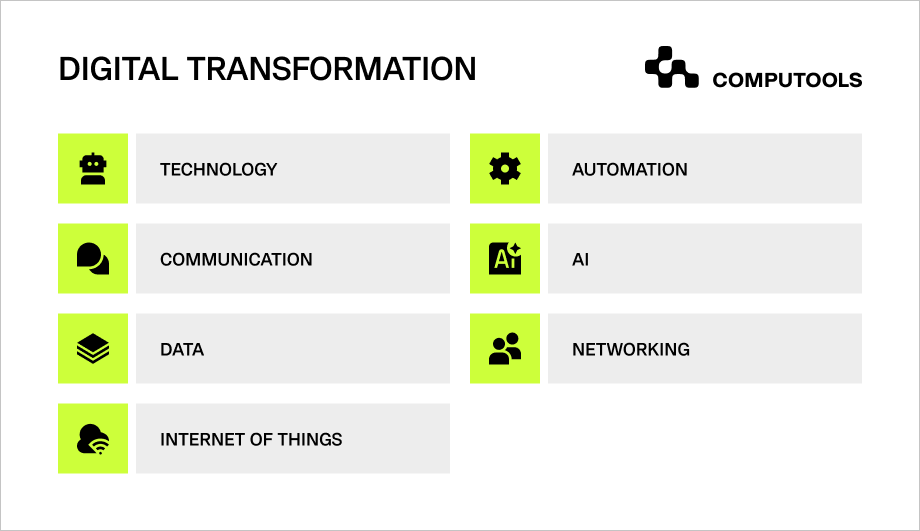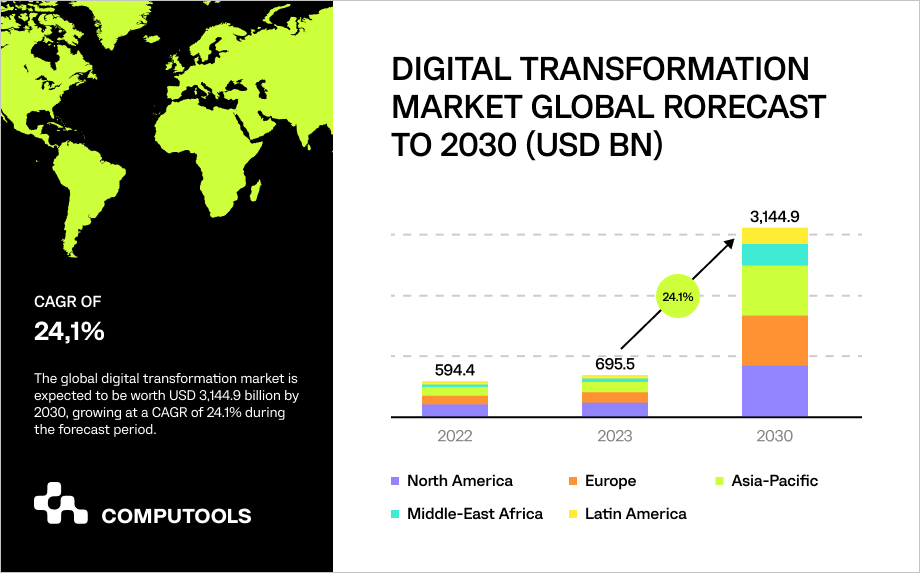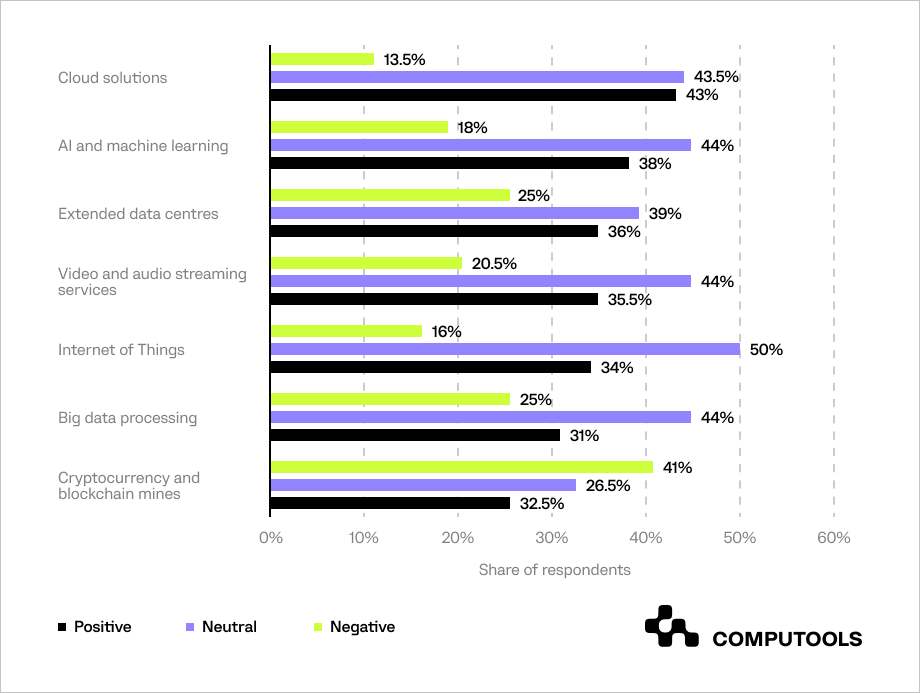Digital transformation trends for businesses signal major changes in Eastern Europe, transforming the way industries, workplaces and other sectors function through the increasing adoption of new technologies.
Modern innovations such as the Internet of Things, artificial intelligence, robotics, 5G, blockchain, cloud technology, drones, 3D printing and more are at the forefront of this transformation.
Digitalisation is not just a trendy term but a significant shift that affects how we operate and interact in the present-day world.

Based on Statista’s research, the European Software market is forecast to reach around US$146.70 billion in 2023. The growth is expected to continue steadily at a rate of 6.12% each year from 2023 to 2028.
This expansion is directly linked to the considerable returns on investments (ROI) that companies have dedicated to developing and digitising their businesses.

According to Forbes, by automating the HR department, a large organisation could reduce monthly employee time to 15 hours, significantly saving costs. The entire digitalisation process has the potential to pay off tenfold within the first year.
While this change represents just one facet of the organisation’s broader transformation, it is a clearly defined, measurable improvement that aligns with overarching goals.
As a result of these transformations, the ICT sector and e-commerce in Eastern Europe are expected to increase in size in the upcoming years.
Particularly in Poland, a frontrunner among the largest digital markets in Eastern Europe, Statista forecasts the digital economy to reach an estimated value of €122.6 billion by the year 2030.
While the rates of technology adoption in Eastern European countries may be slightly lower compared to their Western neighbours, undeniable growth and benefits are still evident from the current digital shift.
Transformation services offer substantial advantages, catering to both small and medium businesses and large corporations.
As companies in the region embrace innovation services, they stand to gain enhanced efficiency, improved processes and increased automation in the competitive landscape.
In this article, we’ll take a close look at how businesses in Eastern Europe are undergoing digital transformation. We’ll explore the emerging digital solutions, and their effects on entrepreneurs, and consider what the future holds in this dynamic shift.
The Role of Digital Transformation Services in Eastern European Countries
Eastern Europe plays a huge role in the digital transformation of the world. Pro-market reforms, stable currency practices and integration into the European Union have led to swift economic growth throughout the region.
Let’s see how transformation services impact businesses in the biggest Eastern European countries, and what trends influence the tech landscape in the region.
Poland

Poland boasts one of the most developed economies in the Eastern European region, and it is well-positioned to seize the opportunities presented by the ongoing digital revolution.
Digitalisation in Poland is gradually increasing, with more SMBs and corporations requiring new digital solutions.
In 2023, as per a Statista survey, 43.5% of Polish IT experts said that among various technology and digital solutions, cloud computing had the most positive influence. Among business owners in Poland, 68% have already adopted cloud technologies, leveraging their profits and automatisation rates.
While Poland has embraced digital technologies, there’s room for more widespread use. Though most businesses have websites, e-commerce is not prevalent.
Custom Software Engineering for managing customer relationships and enterprise resources is used moderately, and the adoption of advanced technologies like big data lags behind other European countries.
SMEs are less digitalised than larger firms. Given that SMEs make up two-thirds of all employment and half of all output, policy efforts should prioritise enhancing their digitalisation.
For a complete transformation, Poland must digitise its economic core. Companies in utilities, transportation and manufacturing should accelerate digital transitions to match Western European benchmarks in productivity.
Meanwhile, the local retail and financial services sectors, already at the forefront of the digital revolution, should continue their efforts.
Leveraging a skilled pool of IT specialists and affordable, digitally savvy professionals, Poland has the potential to become the most advanced digital economy in Europe.
Czech Republic
Like the rest of the world, the Czech Republic is transforming digitally. Technologies are reshaping every facet of life in the Czech Republic, and their widespread influence is accelerating.
According to the report of the European Commission, the percentage of SMBs with a basic level of digital intensity is 53%, which is slightly below the EU average.
The proportion of companies using top-notch digital software solutions across different functional areas remains steady and aligns with the average EU rates.
The most popular technologies for digital transformation remain social media and business intelligence tools, whose adoption increased from 20% to 24%.
In the realm of research and excellence, the country is prioritising AI and high-performance computing trends. However, the shortage of digital experts hinders companies, particularly SMEs, from advancing more dynamically.
Hungary
Hungary holds the 22nd position among the EU countries in the Digital Economy and Society Index. In recent years, the country has advanced consistently in alignment with the EU.
The biggest transformation trend in Hungary is the digitalisation of public services. There has been a notable increase in e-government users, rising from 64% in 2019 to 81% of internet users in 2021, surpassing the EU average of 65%. The primary factor contributing to these outcomes is the subpar quality of cross-border services.
Recently, the Hungarian government has approved several programmes aimed at assisting SMEs and enterprises in improving their innovation skills and adopting industry 4.0 technologies. These initiatives offer support in terms of advanced technologies to boost competitiveness.
Romania
Similar to many nations, Romania is confronting various challenges in its quest for digital transformation. A significant focus for Romanian authorities is addressing the urban-rural digital gap and furthering the expansion of e-government services.
In the past year, investments in early-stage companies in Romania surged by 130%, backed by around 9,000 new employees joining the Romanian software and digital transformation services industry each year. Ranked among the top 40 global entrepreneurial ecosystems by StartupBlink, Romania aspires to establish itself as a complete European tech hub.
Ukraine
Ukraine has prioritised digitalisation over recent years, led by the Ministry of Digital Transformation aiming to make the country a global digital champion.
Digital IDs with no internal restrictions are already in use, signalling Ukraine’s commitment to becoming a leading provider of services for citizens and businesses.
The IT sector is a crucial part of this journey, employing over 280,000 specialists and contributing 4% to the GDP of the country, with nearly 40% of export services.
Despite war challenges, the Ukrainian IT industry and digital transformation trends remain resilient, standing as the only sector increasing exports and generating foreign exchange earnings during this period.
By May 2022, 85% of SMEs and larger ventures had resumed their operations to pre-war levels, driven by digital solutions and services.

Computools
Software Solutions
Computools is an IT consulting and software engineering company that delivers innovative solutions to help businesses unlock tomorrow. Our clients represent a wide range of industries, including retail, logistics, finance, healthcare, and others.
Top Digital Transformation Trends for Businesses in Eastern Europe
1. Artificial Intelligence and Machine Learning
Customers now consider speed, efficiency and personalisation not just as extra benefits but as essential expectations from every business. Enterprises integrate AI and ML into their digital strategy to meet customer expectations that are getting higher every year.
The AI market in Poland alone was valued at over US $572 million, with machine learning holding the lion’s share of the industry.
Benefits for business: AI and ML may help SMBs and enterprises in their digital transformation journey in various ways, including:
1. Automating tasks and cutting labour costs
2. Empowering decision-makers with data-driven insights for informed choices
3. Analysing customer data for personalised experiences
One of many examples of how AI mechanisms may be used in real life is the development of chatbots for customer service.
These bots handle everyday customer questions and bring in human agents only when needed. This saves time and resources, benefitting both clients and business owners.
2. Multi-Cloud
Many businesses have employed multi-cloud environments for their operations in recent years. As per a McKinsey report, the majority of businesses are expected to direct 80% of their IT funds to the cloud by 2024.
Benefits for business: Using cloud computing technologies is crucial for making managed services work better and leads to the following results.:
1. Shifting to the cloud leads to cost savings by reducing expenditures on hardware, software, and maintenance.
2. The cloud provides a scalable and flexible infrastructure, enabling businesses to swiftly adapt to changes and enhance agility.
3. Cloud providers offer an array of cloud-based tools and services, facilitating faster innovation for mid-sized businesses.
4. Applications operating in multi-cloud environments can be customised to perform specific functions through the utilisation of APIs.
3. Internet of Things and 5G
The integration of IoT and 5G is reshaping connectivity by allowing seamless communication between devices. IoT involves interconnected devices sharing data for real-time insights, while 5G provides high-speed, low-latency networks.
Benefits for business: The collaboration between IoT and 5G could usher in numerous advancements. For instance, consider a manufacturing facility where IoT devices, connected through 5G, enable seamless communication and data exchange.
This integration could lead to real-time monitoring of machinery, efficient inventory management, and predictive maintenance, optimising overall operational efficiency.
Moreover, deploying AI, drone-initiated inspections and video inspections can automate repetitive tasks, ensuring streamlined processes and preventing potential network issues for enhanced productivity in the business environment.
4. Cybersecurity
Ensuring data security is an ongoing worry, and client data is particularly vulnerable due to the high stakes involved. A single data breach can ruin customers’ trust, especially when their addresses, credit card details and email addresses are in jeopardy.
Benefits for business: Mid-sized companies are increasingly prioritising cybersecurity to prevent data breaches, financial losses, and reputation damage.
This focus has become even more critical with the rise of hybrid work, where hacking scams and cyber attacks pose challenges to privacy protection.
Implementing strong cybersecurity measures, such as encryption and secure access controls, ensures that customer data is shielded from unauthorised access.
For instance, a financial institution using robust encryption protocols can protect customer account information from being compromised in the event of a cyberattack, maintaining the confidentiality and integrity of sensitive data and avoiding reputational damages.
5. Mobility and App Development
Over time, businesses have recognised that old-fashioned websites and social media interactions may be not enough to gain a competitive edge. That’s why they’re now looking into mobility trends and creating their own apps.
Benefits for business: App development offers several advantages for businesses, helping companies to reach a broader audience, tapping into a larger market and enhancing their brand visibility.
In response to the challenges posed by the COVID-19 pandemic, many businesses in Eastern Europe have undergone a digital transformation to better align with market needs.
The impact of COVID has significantly accelerated this shift, and companies that had previously adopted digital strategies found themselves better equipped to navigate the challenges of this period.
This digital transformation has been particularly helpful in the food market. Restaurants and cafes, recognising the significance of technologies during COVID-19, invested in mobile apps to simplify menu browsing, facilitate order placement, and minimise physical interactions.
Apps also provide a direct and personalised channel for businesses to interact with their customers. Features such as push notifications and in-app messaging enable companies to communicate promotions, updates and special offers, fostering a stronger connection with their audience.
MiniGuide How to Choose a Digital Transformation Company
When selecting a digital transformation company, make sure it adapts to your organisation’s changing needs. Consider the following essential factors.
1. Experience Matters
Examine how long the company has been involved in digitalisation and check its digital transformation case studies. Check their website, analyse key industries and services and look at their reviews on B2B portals, such as Clutch and GoodFirms.
2. Client Portfolio
Look into the businesses the company has worked with previously. Prioritise companies that have well-established track records within your industry. This not only serves as a testimonial to its services but also indicates whether it has subject matter expertise in your specific field.
3. Team Expertise
Check the abilities of the team assigned to your project. Forbes experts suggest having several interviews to confirm they have the necessary technical skills and good soft skills for both professional outcomes and clear communication.
4. Technology Offerings
Understand why you need business digitalisation and look for a partner who provides the necessary tech stack. For instance, if you’re seeking cloud computing services, then prioritise finding a digital transformation partner with expertise in cloud architecture, data migration, security protocols and leading cloud platforms.
5. Commitment to Learning
Choose a company that prioritises ongoing learning. Regular training sessions, both internal and external, show their commitment to staying updated with the latest trends in digital transformation and technological changes, which is crucial for long-term viability.
Future Impact of Digital Transformation Trends on Businesses
The upcoming impact of digital transformation trends for businesses in Eastern Europe involves various shifts, including the adoption of automation and AI, reshaping customer experiences, and a crucial focus on cybersecurity. This transformation is relevant for both SMEs and larger corporations.
Companies that actively embrace and adjust to these changes position themselves to thrive in the evolving digital landscape, gaining a competitive edge.
Importantly, as these trends continue to develop, businesses stand to gain even more benefits, not only contributing to their individual growth but also playing a central role in advancing the overall economic well-being of the region.
Align your business strategy with the latest technological trends in your region. Reach out to us at info@computools.com for valuable insights and guidance.









“Computools was selected through an RFP process. They were shortlisted and selected from between 5 other suppliers. Computools has worked thoroughly and timely to solve all security issues and launch as agreed. Their expertise is impressive.”